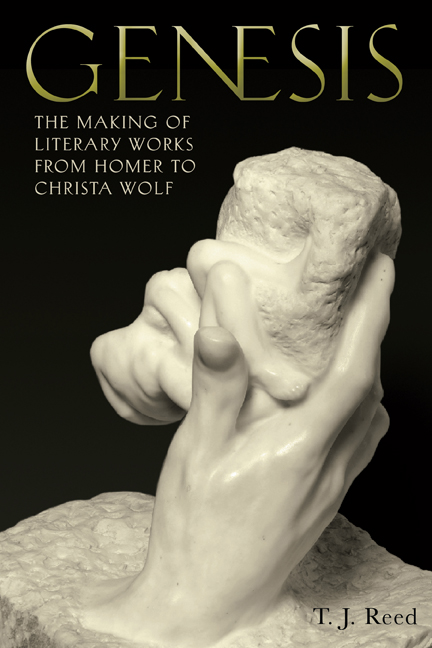Book contents
- Frontmatter
- Dedication
- Contents
- Note on Quotations and Translations
- Preface
- Introduction: Processes
- Part I Antiquity
- 1 Homer's Audiences: Shaping the Iliad (and the Odyssey)
- 2 Fourfold Genesis: The Bible between Literature and Authority
- Part II Early Modern
- 3 An Alphabet of Experience: Montaigne
- 4 Beginner's Luck: Shakespeare's History Cycles
- Transition—Tradition
- Part III Goethe
- 5 Cross-Purposes: Goethe's Faust
- 6 Occasions: Goethe's Lyric Poetry
- 7 Live and Learn: Werther and Wilhelm Meister
- Part IV Nineteenth- and Twentieth-Century German
- 8 Writing on the Run: Georg Büchner's Revolutions
- 9 “The Best-Laid Schemes…”: Thomas Mann Unplanned
- 10 Description of a Struggle: Kafka's Half-Escape
- 11 Atomic Beginnings: Brecht, Galileo, and After
- 12 Knowing and Partly Knowing: Paul Celan's Mission
- 13 Christa Wolf: A Fall from Grace
- Afterword
- Notes
- Bibliography
- Index
3 - An Alphabet of Experience: Montaigne
Published online by Cambridge University Press: 16 September 2020
- Frontmatter
- Dedication
- Contents
- Note on Quotations and Translations
- Preface
- Introduction: Processes
- Part I Antiquity
- 1 Homer's Audiences: Shaping the Iliad (and the Odyssey)
- 2 Fourfold Genesis: The Bible between Literature and Authority
- Part II Early Modern
- 3 An Alphabet of Experience: Montaigne
- 4 Beginner's Luck: Shakespeare's History Cycles
- Transition—Tradition
- Part III Goethe
- 5 Cross-Purposes: Goethe's Faust
- 6 Occasions: Goethe's Lyric Poetry
- 7 Live and Learn: Werther and Wilhelm Meister
- Part IV Nineteenth- and Twentieth-Century German
- 8 Writing on the Run: Georg Büchner's Revolutions
- 9 “The Best-Laid Schemes…”: Thomas Mann Unplanned
- 10 Description of a Struggle: Kafka's Half-Escape
- 11 Atomic Beginnings: Brecht, Galileo, and After
- 12 Knowing and Partly Knowing: Paul Celan's Mission
- 13 Christa Wolf: A Fall from Grace
- Afterword
- Notes
- Bibliography
- Index
Summary
Withdrawal
IN 1571 THE BORDEAUX JURIST, Michel Eyquem, Sieur de Montaigne, retired for good (or so he thought) from public life to spend his remaining days—he was thirty-eight, it could be considered oldish then—in the “liberty and tranquility” of his family estate and “the bosom of the Muses.” He established a retreat in one of his château’s two towers, with a library of some thousand books, the perfect environment and resource for a life of reflection. On the beams he had painted the resolve to leave his mind “in complete idleness to amuse itself.” But as weeds spring up in a fallow field, idleness produced all manner of “chimeras and fantastic monsters.” The horse (he switches metaphors— riding was a valued part of his life) had bolted. These things needed getting a grip on and “shaming into order.” So he started writing. (1, viii; 70)
Just what the monsters were is unclear. Nothing monstrous appears in Montaigne's earliest “essays.” In their original form, they are not much more than entries in a commonplace book, short conventional pieces about popular sayings—“that we arrive at the same end by different means”; or about narrowly practical problems—“should a besieged commander venture out to parley?” a typical real-life (and -death) dilemma in a France torn by religious wars. These pieces were not going to set the Garonne on fire.
A personal note may slip in, as when Montaigne admits to having a terrible memory—this as a prelude to a piece “On Liars” (liars need to remember what they’ve said to whom [1, ix; 71]). But by the time he comes to publish the first edition of his Essais in 1580, the personal element has become their declared whole and sole point. Not however with any wide literary ambition. A prefatory note To the Reader states that he is leaving an account of his “conditions and humors” for family and friends to remember him by when he is no more. For this “domestic and private” purpose he is “himself the substance of his book,” so it's not worth anyone else's while to spend their leisure on “a subject so frivolous and so vain.” Don't bother!
- Type
- Chapter
- Information
- GenesisThe Making of Literary Works from Homer to Christa Wolf, pp. 57 - 77Publisher: Boydell & BrewerPrint publication year: 2020



